Welcome to Virginia, where the forests whisper tales of adventure and the fields invite you to join the hunt. From the rolling hills to the shimmering waters, Virginia is a treasure trove for hunters. Whether you’re chasing after a majestic deer or listening for the call of wild turkeys, Virginia promises a hunting journey you won’t forget. Grab your gear, and let’s explore what this amazing state has to offer!
In this detailed guide, we have covered all you need to know about hunting in Virginia. We will discuss the species you can hunt here, the best places to find them, license information, and hunting seasons right here on this page. So without any further ado, let’s get started.
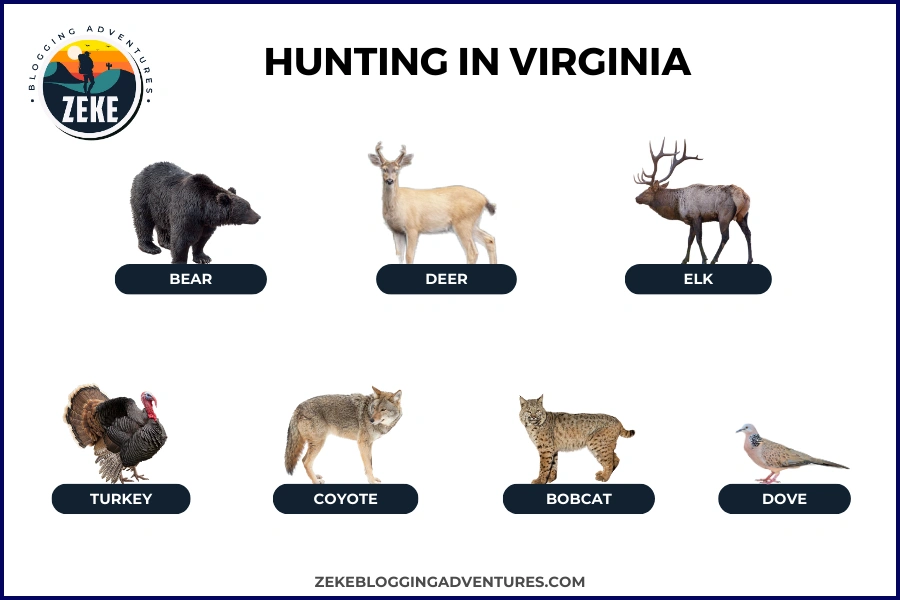
What Can You Hunt in Virginia?
In Virginia, there are many animals you can hunt if you have the right permit and it’s the correct season. Popular big animals include white-tailed deer, elk, black bear, and wild turkey. For smaller game, hunters often look for squirrels, rabbits, and quail.
If you like water hunting, Virginia’s waters have ducks and geese. Plus, there’s a special place called the Eastern Shore that’s really good for waterfowl hunting. The mountainous areas, like the Appalachian Mountains, are challenging but can be great for hunting wild boar.
Deer
The white-tailed deer, also known as Odocoileus virginianus, is a powerful and awe-inspiring creature that can be found all over Virginia. From the rolling hills of the Appalachians to the lush forests and farmland – they’re everywhere!
These graceful animals are famous for their agility and keen senses which make them incredibly challenging prey even for experienced hunters. They have majestic antlers too which reach up to two feet in length; symbolizing strength within their herds.
Virginia offers various hunting seasons specifically catered towards these white-tailed deer such as archery, muzzleloader, or firearm season – each one presenting its own unique set of challenges and rewards for those who take part in it.
Regardless if you prefer stalking silently with a bow or testing your precision skills with a rifle, there’s something here for any type of hunter! But don’t forget: these creatures play an important role in keeping our ecosystems well-balanced too!
It goes without saying that before taking on this hunt, you need to make sure you know all state regulations regarding license requirements & permits so everything runs smoothly during your trip out into nature’s playground. For detailed deer season dates, counties, and bag limits, kindly visit the Virginia Department of Wildlife Resources website.
Deer Season Virginia
| Season | Dates |
| Early Archery | Oct 07 – Nov 17 |
| Late Archery | Dec 03 – Jan 06, Dec 01 – Jan 06, Dec 17 – Jan 06 |
| Urban Archery | Sep 02 – Oct 06, Jan 07 – Mar 31 |
| NOVA Late Archery | Apr 01 – Apr 28 |
| Youth & Apprentice Hunt | Sep 30 & Oct 01 |
| Early Muzzleloader | Nov 04 – Nov 17 |
| Late Muzzleloader (East of the Blue Ridge) | Dec 16 – Jan 06, Jan 01 – Jan 06 |
| Late Muzzleloader (West of the Blue Ridge) | Dec 16 – Jan 06, Jan 01 – Jan 06 |
| Firearms | Nov 18 – Dec 02, Nov 18 – Jan 06, Oct 01 – Nov 30, Nov 18 – Dec 16, |
| Early and Late Antlerless Only Firearms | Sep 02 – Oct 06, Jan 07 – Jan 31, Jan 07 – Jan 31 |
Elk
Elk, also known as wapiti, are some of the largest deer species found in North America. These majestic creatures can reach up to 700 pounds and stand over 5 feet tall at their shoulders. Their muscular build and impressive antlers make them a popular game animal among hunters all around the country.
Unfortunately, by the late 1800s, elk had been completely wiped out from Virginia due to habitat loss and excessive hunting pressure. But thanks to conservation efforts, they were reintroduced back into the state in 2012 – giving you an amazing opportunity to witness these animals again.
The best time for hunting elks is during fall when males fight for dominance through bugling calls and fierce battles with their antlers – it’s truly something every hunter should experience at least once in their lifetime!
But one must never forget that despite being wild animals; they possess an impressive level of intelligence along with sharp senses that allow them to spot human presence from miles away – making it essential for any hunter looking forward to hunting this magnificent creature to be well prepared with proper techniques and gear.
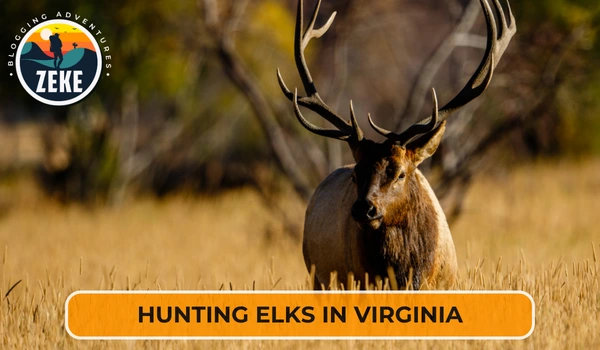
Elk Season in Virginia (via Lottery)
| Season | Dates |
| Elk | Oct 14 – Oct 20 |
Bear
The black bear is the most common species of bear found in Virginia. These strong and agile creatures can range anywhere from 200 to 600 pounds, with coats ranging from jet black to light brown. For those wanting a rewarding hunting experience, look no further than the Appalachian Mountains – home to dense forests that provide an ideal habitat for these animals.
However, it’s important that hunters adhere to all regulations when it comes to pursuing bears in Virginia; always prioritize safety and ethical practices! Once you sort out your permits and prepare properly for the hunt, you’ll need skillful patience to navigate the rugged terrain.
Bear Season VA
| Season | Dates |
| Archery | Oct 07 – Nov 17 |
| Muzzleloader | Nov 11 – Nov 17 |
| Early Firearms | Oct 02 – Oct 04 |
| Firearms | Oct 01 – Jan 06, Nov 27 – Jan 06, Dec 04 – Jan 06 |
| Bear Hound Training/Chase | Nov 18 – Dec 22, Aug 01 – Sep 30 |
| Youth & Apprentice Hunt | Oct 14 & Oct 15 |
Turkey
Avid turkey hunters find Virginia to be a dream come true. Boasting an abundance of Eastern and Osceola turkeys, the state offers plenty of variety for those looking to add to their trophy collection. From rolling hills in the Blue Ridge Mountains down to marshy lowlands near the coast, there’s no shortage of prime habitat for these majestic birds.
But it’s not just about quantity – Virginia also provides quality when it comes to turkey hunting. Thanks to rigorous regulations and management practices, you can expect mature specimens with impressive beards and spurs! Not only does this make your hunt more thrilling but it helps ensure sustainable populations for future generations too.
When planning your hunting in Virginia, don’t forget about public land opportunities either: with over 1 million acres available statewide (including national forests), DIY enthusiasts will have lots of options at their disposal! If guided tours are more up your alley though – don’t fret; there are many expert outfitters providing knowledgeable help throughout the region as well.
Turkey Season Virginia
| Season | Dates |
| Archery | Oct 07 – Nov 17 |
| Youth & Apprentice Fall Hunt | Oct 14 & Oct 15 |
| Fall Firearm Turkey | Oct 21 – Nov 03, Nov 22, Nov 23, Dec 04 – Dec 30, Jan 17 – Jan 27, Dec 04 – Dec 16, |
| Youth & Apprentice Spring Hunt | Apr 06 & Apr 07 |
| Spring Turkey | Apr 13 – Apr 28, Apr 29 – May 18 |
Bobcat
Hunting bobcats is a challenge for even the most experienced hunter. It requires strategy and patience to successfully spot one of these elusive cats, as they are primarily nocturnal and prefer to hunt alone. To up your chances, it’s best to head out at dawn or dusk when their activity peaks.
As opportunistic predators, bobcats feed on small mammals like rabbits or rodents but will take down larger prey such as deer if given the opportunity so be sure you have all permits necessary before heading into Virginia’s forests in pursuit of them.
There are various hunting techniques available depending on skill level – some hunters opt for using calls while others may choose the spot-and-stalk method of waiting patiently until they get an opportune moment to take a shot. Just make sure you stick by regulations set in place for conservation purposes.
Bobcat Season VA
| Season | Dates | Bag Limit |
| Archery | Oct 07 – Oct 31 | 2 per hunting party |
| Firearms | Nov 01 – Feb 29 | 2 per hunting party |
Dove
Dove hunting in the Old Dominion is an exciting and rewarding activity, especially during the fall season. With millions of acres of agricultural fields across the state providing a perfect habitat for these birds, it’s easy to see why they’re such a popular game bird among hunters.
When prepping for your dove hunt expedition, remember that simplicity is key – all you need is a 12 or 20-gauge shotgun with an improved cylinder choke along with some camouflage clothing. It’s important to have all necessary licenses and permits as well as be mindful about safety at all times when handling firearms outdoors; never shoot low-flying birds or towards houses or roads.
Once everything has been set up properly and you’ve got your gear ready, now comes the fun part: actually hunting doves! These agile creatures will challenge even experienced hunters due to their fast flight patterns, so keep your eyes peeled and get ready for some adrenaline-filled action! And don’t forget that dove meat makes great eating too – making this type of hunt doubly enjoyable.
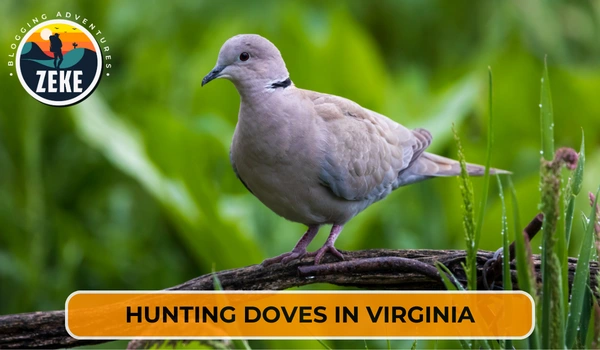
Dove Season VA
| Season | Dates | Bag Limit |
| 1st Segment (Statewide) | Sep 02 – Oct 22, Sep 03 – Oct 22 | 15 per day |
| 2nd Segment (Statewide) | Nov 18 – Nov 26 | 15 per day |
| 3rd Segment (Statewide) | Dec 22 – Jan 20 | 15 per day |
| 1st Segment (WMAs) | Sep 02 – Oct 21, Sep 03 – Oct 21 | 15 per day |
| 2nd Segment (WMAs) | Nov 18 – Nov 26 | 15 per day |
| 3rd Segment (WMAs) | Dec 22 – Jan 20 | 15 per day |
Coyote
Coyotes have been part of Virginia’s landscape for ages, but their numbers have boomed recently. This is likely due to their adaptability – they hunt and scavenge in forests, mountains, and even suburban areas. What sets them apart from other game animals though is their intelligence; they’re masters at evading predators thanks to a sharp sense of smell and hearing.
Hunting coyotes can be an exciting but challenging experience since you’ll need more than just luck on your side. In Virginia, there’s no bag limit so it’s up to you as ethical hunters to practice responsible hunting techniques: take shots only when you know you can make them cleanly.
There are various methods that one could use – calling with electronic or mouth calls, spot-and-stalk, the possibilities are endless! But no matter which strategy you choose, patience is key if you want success in harvesting a coyote.
Coyote Season in Virginia
| Season | Dates | Location |
| Coyote | Sep 01 – Mar 10 | National Forest lands and Department lands |
Rabbit Season VA
| Season | Dates | Bag Limits |
| General | Nov 04 – Feb 29 | 6 per day |
Squirrel Season
| Season | Dates | Bag Limits |
| Fall Season (Statewide) | Sep 02 – Feb 29 | 6 per day |
| Spring Season | Jun 01 – Jun 15 | 6 per day |
Quail Season
| Season | Dates | Bag Limits |
| General | Nov 11 – Jan 31 | 6 per day |
Pheasant Season
| Season | Dates | Bag Limits |
| General | Nov 11 – Jan 31 | No Limit |
Crow Season
| Season | Dates |
| General | Aug 19 – Mar 15 |
| National Forest Lands and Department lands | Sep 01 – Mar 09 |
Groundhog Season
| Season | Dates | Location |
| General | Open Season | Private Lands |
Grouse Season
| Season | Dates | Bag Limits |
| General | Oct 28 – Feb 10 | 3 per day |
Fox Season
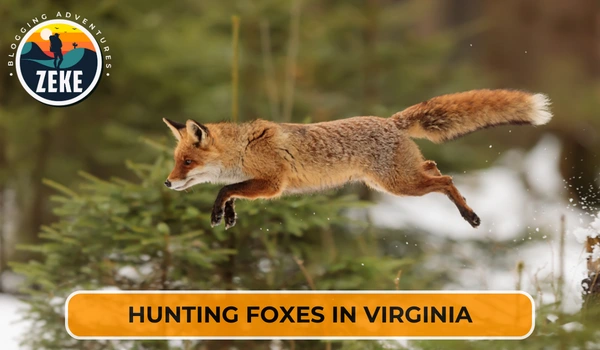
| Season | Dates |
| Red Fox | Nov 01 – Feb 29 |
| Gray Fox | Jan 01 – Feb 29 |
Skunk Season
| Season | Dates |
| Hunting Season (Striped Skunk) | Open Season |
| Trapping Season (Striped Skunk) | Open Season |
Opossum Season
| Season | Dates |
| Hunting Season | Oct 15 – Mar 10 |
| Trapping Season | Nov 15 – Feb 29 |
Raccoon Season
| Season | Dates |
| Firearms Season | Oct 15 – Mar 10 |
| Chase only Season | Aug 01 – Sep 30 |
Mink Season
| Season | Dates |
| Trapping Season | Dec 01 – Feb 29 |
Nutria Season
| Season | Dates |
| Trapping Season | Open Season |
Muskrat Season
| Season | Dates |
| Trapping Season | Dec 01 – Feb 29 |
Weasel Season
| Season | Dates |
| Trapping Season | Dec 01 – Feb 29 |
Beaver Season
| Season | Dates |
| Trapping Season | Dec 01 – Feb 29 |
Otter Season
| Season | Dates |
| Trapping Season | Dec 01 – Feb 29 |
Duck Season
| Season | Dates | Bag Limit |
| Duck | Oct 06 – Oct 09, Nov 15 – Nov 26, Dec 19 -Jan 31 | 6 per day |
Teal Season
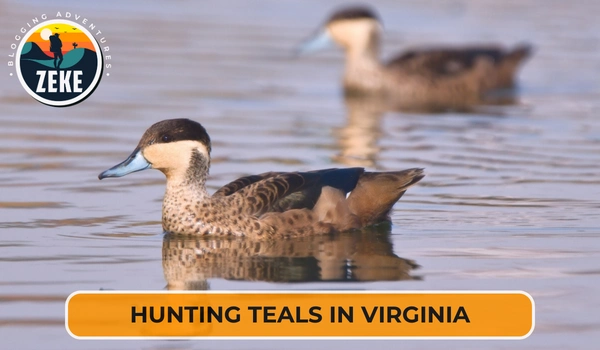
| Season | Dates | Bag Limit |
| September Teal | Sep 17 – Sep 30, Sep 21 – Sep 30 | 6 per day |
Coot & Merganser Season
| Season | Dates | Bag Limit |
| Coot & Merganser | Oct 06 – Oct 09, Nov 15 – Nov 26, Dec 19 -Jan 31 | Coot: 15 daily Merganser: 5 daily |
Goose Season
| Season | Dates | Bag Limit |
| Canada Goose Atlantic Population Zone Seasons | Nov 22 – Nov 26, Dec 23 – Jan 31 | 2 per day |
| Canada Goose Resident Population Zone Seasons | Nov 15 – Nov 26, Dec 19 – Feb 24 | 5 per day |
| September Canada Goose | Sep 01 – Sep 25 | 10 per day |
| Light Goose Regular Season | Oct 17 – Jan 31 | 25 per day |
| Light Goose Conservation Order | Feb 01 – Apr 05 | No Limit |
Brant Season
| Season | Dates | Bag Limit |
| Atlantic Brant | Dec 23 – Dec 31, Jan 11 – Jan 31 | 1 per day |
Swan Season
| Season | Dates | Bag Limit |
| Tundra Swan | Nov 15 – Jan 31 | 1 per permit |
Gallinule Season
| Season | Dates | Bag Limit |
| Gallinule | Sep 11 – Nov 05, Nov 13 – Nov 26 | 15 per day |
Rail Season
| Season | Dates | Bag Limit |
| Sora & Virginia Rail | Sep 11 – Nov 05, Nov 13 – Nov 26 | 25 per day |
| King & Clapper Rail | Sep 11 – Nov 05, Nov 13 – Nov 26 | 15 per day |
Woodcock Season
| Season | Dates | Bag Limit |
| Woodcock | Nov 10 – Nov 27, Dec 26 – Jan 21 | 3 per day |
Snipe Season
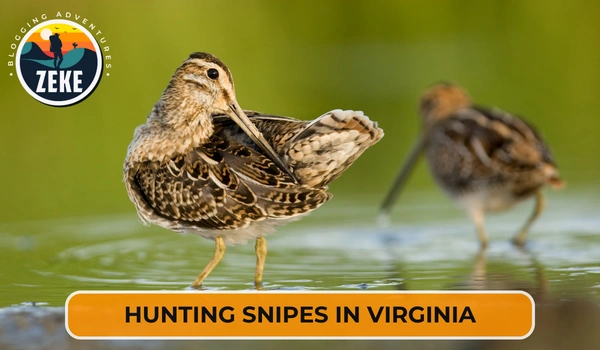
| Season | Dates | Bag Limit |
| Snipe | Sep 25 – Nov 26, Dec 19 – Jan 31 | 8 per day |
Youth & Veteran Waterfowl Season
| Season | Dates |
| Youth/Veteran Waterfowl | Oct 21 & Feb 03 |
Virginia Hunting License Information
At 16 years or older, anyone who wishes to hunt in Virginia must possess a valid hunting license. This requirement applies both to residents and non-residents alike.
In regards to licenses, there are three categories: resident, non-resident, and lifetime options. A resident license is designed for those who have been living in the state for at least 30 days before purchasing it; while a non-resident one allows individuals without residency status to take part in the activity within Virginia’s borders. Lifetime licenses offer unrestricted access throughout an individual’s life span – regardless of whether they’re residents or not.
When it comes down to cost, resident licenses tend to be more affordable than their counterpart intended for out-of-state hunters; however certain game types may require additional tags which can be purchased separately from the basic licensing fee itself (e.g., waterfowls or turkeys). A 1-year hunting license costs $23 for residents and $111 for non-residents in the state of Virginia.
Moreover, special permits might also need to be obtained depending on your chosen type of hunt – these can be obtained online through designated vendors across Virginia.
Remember that all laws set by the Department of Game and Inland Fisheries should always be adhered to during any kind of hunting with a valid license, failure to do so could lead to severe penalties including permanent revocation of privileges.
Where Can You Hunt in Virginia?
Virginia offers no shortage of public hunting grounds, with over 1.5 million acres scattered across its various regions. These include national forests, wildlife management areas, and state parks that feature a range of game like deer, turkey, bear, and small critters such as squirrels and rabbits.
The George Washington & Jefferson National Forests are particularly popular for hunters looking to bag some deer or turkey – covering over one million acres of prime hunting real estate! The Shenandoah National Park is also an excellent spot for the fall season’s bear hunts.
For waterfowlers in search of ducks or geese on their next hunt trip? Look no further than Virginia’s Chesapeake Bay region; boasting eleven million acres filled with intertwining tidal waters and marshes perfect for honing your skills.
Not only this but private landowners can be found throughout the area who offer permission-based access to those seeking even more diverse opportunities when it comes to hunting adventures within Virginia’s borders.
Public Hunting Places in Virginia
George Washington and Jefferson National Forests
The George Washington and Jefferson National Forests are home to a stunning array of wildlife, offering hunters an incredible variety of game from white-tailed deer to wild turkey. With distinct zones for both rifle and archery hunting, these forests provide the perfect balance between challenge and regulation.
For those seeking even more adventure, designated wilderness areas offer unparalleled backcountry experiences away from motorized vehicles, giving you the opportunity to connect with nature on a deeper level.
Safety is always a priority here in the national forests; we strongly recommend wearing blaze-orange clothing when out in the field so other hunters can easily spot you. Before you head out on your hunt, make sure to check the local state laws and regulations to prepare yourself!
Lake Anna State Park
At Lake Anna State Park, situated in central Virginia, outdoor enthusiasts can explore over 3,000 acres of diverse terrain featuring lush forests, sprawling fields, and wetland habitats. This makes it the ideal location for hunters to get their next big catch – whether that’s a deer or turkey during the season (September-January) or some small game like rabbits and squirrels all year round.
The park is home to an abundance of white-tailed deer which make for great targets for skilled marksmen looking to test their skills and strategy as they take in the scenery around them. Bird-hunting aficionados will also be pleased with its flourishing population of turkeys; you’ll hear them gobbling through trees while waiting for your chance at success!
And if small game hunting is more your speed, then there’s plenty here with open spaces and dense cover areas providing just what these animals need.
James River State Park
James River State Park is a paradise for anyone hunting in Virginia. With 1,500 acres of diverse terrain ranging from rolling hills to dense forests, game species like deer, turkey, squirrels, rabbits, and waterfowl can be found in abundance. This park is an ideal destination for hunters who want to test their skills with still hunting or spot-and-stalk techniques as well as stand hunting – all against the stunning backdrop of this beautiful landscape!
Beyond offering exceptional hunting opportunities, however, lies James River State Park’s commitment to conservation and sustainability. The park follows state regulations closely while collaborating with wildlife management agencies – allowing them to ensure natural habitats are preserved and healthy animal populations thrive for generations of ethical hunters. On top of that, they provide special access hunts for disabled persons and youth-only hunts which promote diversity within the community even further.
Pocahontas State Park
Situated in Chesterfield County, Virginia, Pocahontas State Park is an outdoor haven boasting over 8,000 acres of varied terrain. From rolling hills and lush forests to open meadows and fields, this park offers a range of habitats for hunters both novice and seasoned alike.
White-tailed deer are the main attraction here; with robust numbers and stringent management plans in place, you’re sure to have a successful hunt! You’ll also find ample opportunities for turkey hunting as well as squirrels or rabbits if small game’s more your style.
Furthermore, if bowhunting is what you seek then look no further – designated areas throughout the park provide plenty of room to perfect those skills. And Waterfowl fanatics won’t be disappointed either thanks to numerous lakes and ponds providing excellent duck hunting opportunities.
Briery Creek Wildlife Management Area
Briery Creek WMA is an ideal spot for waterfowl hunting, particularly in its small coves. Over time wood ducks, mallards, and Canada geese have made this area their home turf. As if that wasn’t enough to get any outdoorsman excited – beavers, muskrats, or even otters can be spotted frolicking about in some parts of it!
Up on higher ground, you might also come across bobcats roaming around with foxes close behind them; raccoons here too – not forgetting opossums either.
Private Hunting Places in Virginia
Before hitting the trails on private hunting lands in Virginia, make sure to get your hunting license. Do some research beforehand so you know the landowner’s regulations and rules. The weather here can be unpredictable so wear proper footwear, and clothing that blends into the environment like camo gear, and bring a reliable firearm or bow for hunting.
Some popular spots include Shenandoah Valley for deer and turkey, Eastern Shore for waterfowls, plus the Appalachian Mountains if you’re up for bear or wild boar hunting. Respect nature as well as landowners; pack out what you brought with you and stay safe at all times!
